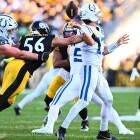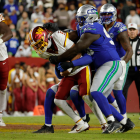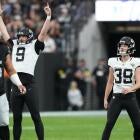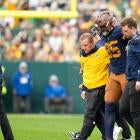Live by the foot, die by the foot: Why the NFL saw a wild week of blocks and what it means for special teams
Special teams coaches find themselves playing whac-a-mole
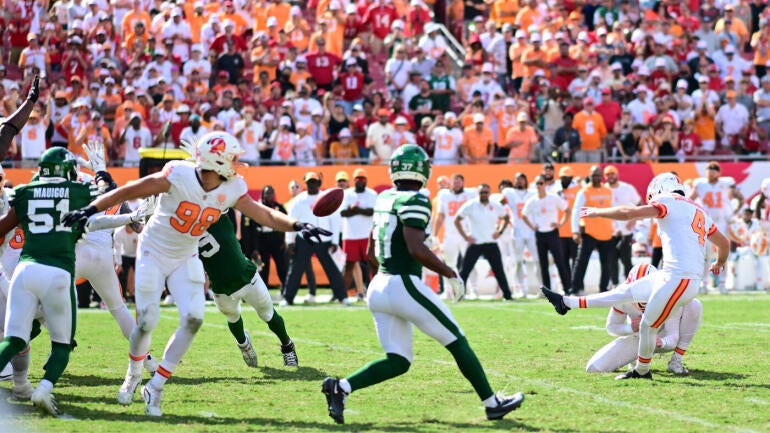
The NFL's Week 3 saw a comedy of consequential kicks blocked as chaos reigned across the league.
In Philadelphia, game-changing field goal blocks kept the Eagles perfect. The Packers would have gone 3-0 if their game-sealing try wasn't blocked in Cleveland (much to the chagrin of many a survivor leaguer). Aaron Glenn was sent dancing on the sideline after a blocked field goal that nearly gave him his first win as a coach.
There have been more blocked kicks -- punts, field goal attempts and point-after tries -- in the first three weeks of this season than that same period in any season since 2014. The seven field goals, three punts and two extra points blocked equal 12, trailing only the combined 17 from 2014 as the most in two decades of play.
It is admittedly a small sample size, so a random week like Week 3 can make for such a once-in-a-decade statistic. But while most kicks are individual snowflakes, throughlines can be found in the league.
CBS Sports spoke with nine special teams coaches and players, and the majority pointed to one factor in particular as the biggest in so many blocks this early in the season.
"There's not enough time in a day," said one NFC special teams coach. "Folks are turning their attention and emphasis to the kickoff and kickoff return phases and lacking on the punt and field goal protection.
"The dynamic kickoff is so new and it's an actual, every down play. In previous years you could kind of not spend as much time because you know the opponent is hitting touchbacks every time, so you don't have to be as detailed in your prep and can delegate your time in other phases."
The foot is more alive in the game than it has been in years thanks to the dynamic kickoff, which was introduced to the NFL at the start of the 2024 season. The league will add hundreds of live-ball plays thanks to the new rules, but it perhaps indirectly will lead to more mistakes in other special teams areas.
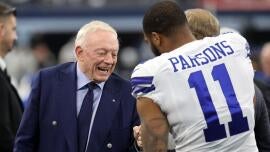
If the dynamic kickoff came into the league last year, why is its impact on other special teams units being felt now instead of 2024? The simple answer is that teams, especially early in the season, didn't treat the new kickoff much differently than the year before.
By the end of the year, the league raised the kickoff return rate from the 2023 historic low of 21.8 percent to just 32.8 percent, well below what the NFL anticipated when it made one of the most radical rule changes in the modern game.
The league adjusted the kickoff this past offseason, notably moving the touchback from the 30 to the 35. Teams have responded by attempting to put the ball in play more, and ahead of the start of Week 4, the kickoff return rate is at 77.3 percent.

Last year teams like the Rams would boot the ball out of the back of the end zone to not even fool with the nonsense the new kickoff brought. L.A. sent all 15 of its kickoffs into the end zone for touchbacks through the first three weeks of the 2024 season. This year, led by knuckleballer Joshua Karty, the Rams have had just six touchbacks on 17 kickoffs, with a handful of those kicked with the intention of being returnable.
That's just one example of one team, but it's true throughout the league. And if there's only so much practice time and more resources are being allocated to kickoff, then that must mean other areas in special teams are suffering.
"I think guys are more focused on kickoff and kickoff return and they're putting more time on that than punt pro," said a second NFC special teams coach. "I can see more teams putting more time in there, and the reason is because, more teams were just banging touchbacks. I think that's been the biggest culprit."
Five punts were blocked through the first three weeks of last season and there have been three already this year. As the league has aimed for more points and better starting field position, there has been a nearly linear decline in punts over the last several years, increasing the blocked punt rate around the league.
The combined nine field goals and PATs blocked are the most through three weeks since 2016, and seven field goal blocks are the most since 2014. Again, not all kicks are created equally, but there's an idea why so many players have gotten their paws on the balls.
"I think the average distance of the field goal attempts, as they've gone up, create a slightly improved opportunity to block kicks because you're getting more lower trajectory balls," said one special teams player.
The average field goal distance this season is 41.5 yards, the highest in league history. Through the first three weeks of 2015, the average was 37.6.
Live-speed field goal block and protection are almost never practiced in the NFL. The potential for injury is too high for teams to regularly practice it in training camp, and the preseason games don't usually have your Week 1 starting unit on the field.
One special teams coach estimated about five teams around the league practiced it at full speed as recently as a few years ago (Bill Belichick's Patriots were one of them, to no one's surprise.) But for many teams, the first time their regular season field goal protection unit sees a live, full-speed rush is in the regular season.
"I think it's from just overall lack of continuity with the players out there playing on special teams," a third NFC special teams coach said. "If you are not playing starters on offense and defense in the preseason, then your starting special teams guys who start on offense and defense are not getting live reps until the season starts."
A fourth special teams coach, this one from an AFC team, agreed that most blocks happen early in the season due to a lack of practice time. But he took it a step further as it relates to personnel.
"Guys are getting beat early in the season because the league has fewer practices and joint practices and the offseason is limited in what you can do, so younger guys aren't developing as quickly," he said. "And there are also so many new specialists that are kicking the ball low on field goals and taking all day on punts. The old guys know how to speed up the process and get the kicks and punts off quicker."
All of that said, sometimes no matter how much you practice, dudes just get beat. The other guys get paid, too.
The Rams spent so much time on their knuckleball kickoff that a lack of practice time on field goal protection directly led to the two blocked attempts Sunday against the Eagles. Several sources around the league indicated the Eagles just exploited an obvious and identifiable weakness in the Rams field goal protection unit, then lined up 6-foot-6, 336-pound Jordan Davis in that spot.
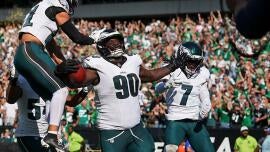
Simply put, Philly's guys were bigger and better.
"Bigger, stronger, more athletic guys are rushing punts and field goals now," the first coach said. "The Giants have [Brian] Burns and [Abdul] Carter out there rushing off the edge. Cleveland has Myles Garrett out there at times."
Said a fifth special teams coach: "People are just being more aggressive and playing their best players." Will McDonald, a first-round pick by the Jets who had 10.5 sacks in 2024, pulling off the block-recover-return trifecta against the Bucs is a clear example of that.
The big spike in Week 3 may have just been variance. And If history is any indication, as the season goes along teams should settle into their units, learn from the mistakes around the league and be able to protect better.
"As there are more games, the more you rep it. Guys just get used to the technique," an NFC coach said. "As a coach you can show them film and say, 'Look there's been eight blocks so shit, we've got to be ready.'"










